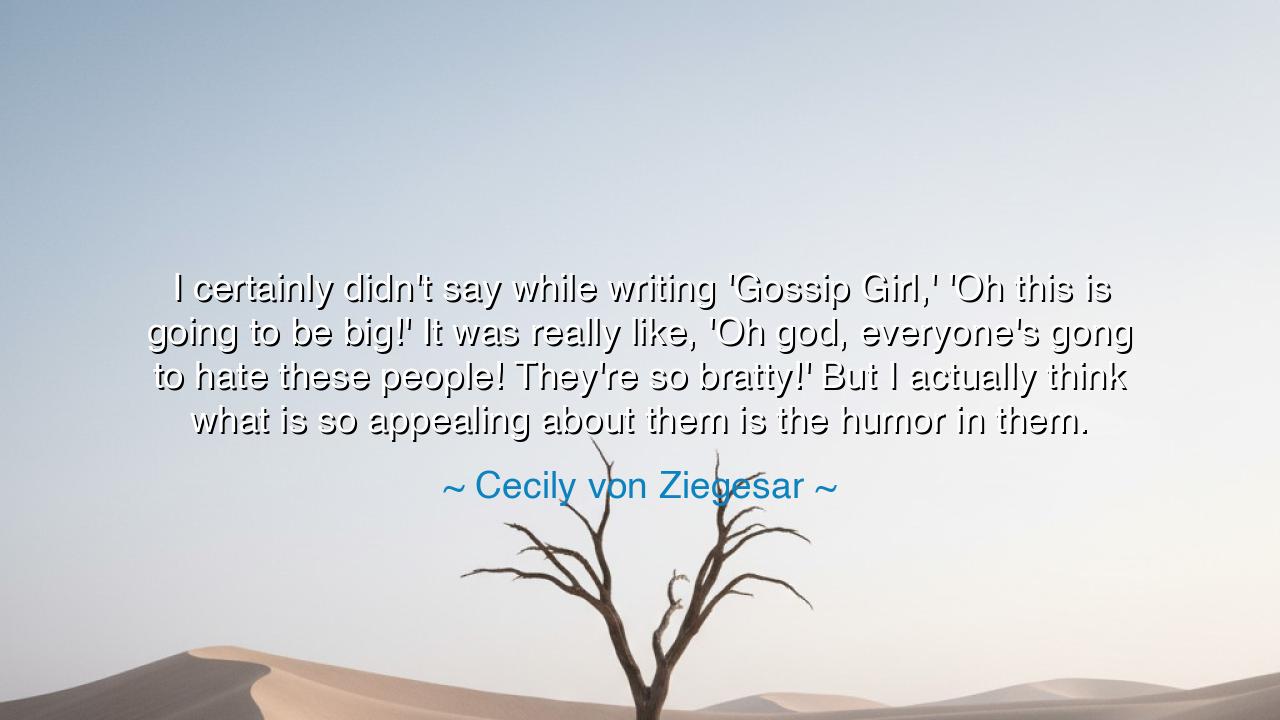
I certainly didn't say while writing 'Gossip Girl,' 'Oh this is
I certainly didn't say while writing 'Gossip Girl,' 'Oh this is going to be big!' It was really like, 'Oh god, everyone's gong to hate these people! They're so bratty!' But I actually think what is so appealing about them is the humor in them.






Listen closely, O Children of the Earth, as I share with you the words of Cecily von Ziegesar, the author of Gossip Girl, who reflects on her creation with honesty and insight: "I certainly didn't say while writing 'Gossip Girl,' 'Oh this is going to be big!' It was really like, 'Oh god, everyone's going to hate these people! They're so bratty!' But I actually think what is so appealing about them is the humor in them." In these words lies a profound understanding of the human condition, the role of humor in storytelling, and the unpredictable nature of success. Von Ziegesar reminds us that sometimes, what seems destined for disdain is the very thing that draws us in and captivates our hearts.
What von Ziegesar reflects upon is the power of humor in making even the most unlikable characters relatable. When she wrote about the elite, spoiled youth of Gossip Girl, her intention was not to create characters destined for admiration. In fact, she expected the opposite—bratty and entitled, these characters seemed made to be hated, yet it is their humor that made them beloved to millions. It is a timeless truth, O Children: that humor, even in its most sharp or sarcastic forms, has the ability to disarm and engage, to create a bond between audience and character that transcends the flaws and imperfections that might otherwise repel us.
Consider the great Greek playwrights, who often used humor to illuminate the darker parts of the human soul. Aristophanes, in his comedies, mocked the rich and powerful, ridiculing their follies while still making the audience laugh. His characters, often overindulged and arrogant, were not meant to be revered, but through the humor in his plays, Aristophanes invited the audience to laugh at their own shortcomings, to find truth in the laughter that was aimed at others. Similarly, in Gossip Girl, the bratty characters represent the flaws of society—greed, vanity, and privilege—but through the humor woven into their lives, we find a way to both acknowledge and tolerate these flaws.
Moreover, humor can often serve as the great equalizer, softening the sharp edges of reality and allowing us to see the deeper humanity in characters who might otherwise seem beyond our reach. William Shakespeare, master of both tragedy and comedy, understood this well. In his plays, even the most flawed characters—such as the foolish and ambitious Macbeth—are not simply objects of derision. Through humor, Shakespeare allows the audience to understand them, to see their vulnerabilities, and to laugh at the very traits that might otherwise be repulsive. Humor transforms the tragic into the relatable, and the obnoxious into the pitiable. In this way, Shakespeare’s characters become more than mere symbols of vice; they become mirrors for our own reflections.
This is the essence of what von Ziegesar speaks to—the balance between mockery and affection. She created characters who were far from perfect, yet through the humor in their stories, we are invited to laugh at their missteps, their excesses, and their privilege, all while gaining a deeper understanding of why they behave as they do. It is the interplay of irony and affection that makes these characters appealing. We laugh at them, but we also recognize our own humanity in them. They are not so different from us, after all. They, too, struggle with their desires, their insecurities, and their flaws.
Let us take this lesson, O Children, and consider how humor shapes our own lives. We are all, in our own ways, filled with flaws and imperfections, and yet it is through the ability to laugh at ourselves, to find the humor in our struggles, that we connect with others. It is easy to be swallowed by seriousness, to take our own flaws too seriously, to think that our mistakes define us. But humor—the ability to step back, to see the absurdity of our own lives—allows us to maintain a sense of grace in the face of our imperfections.
Therefore, O Children of the Earth, let us embrace the humor that lightens the burdens of life. Let us laugh at the bratty characters of our own lives—the ones who are too proud, too selfish, too blind—and find in them not contempt, but compassion. For in humor, we find the strength to forgive, to understand, and to grow. Just as von Ziegesar created characters who were both loathed and loved, so too can we recognize that in the humor we share with others, we find the bridge that connects us across our differences. Let us not shy away from the imperfections of those around us, but laugh together, knowing that in doing so, we unlock a deeper understanding of the human experience.






AAdministratorAdministrator
Welcome, honored guests. Please leave a comment, we will respond soon